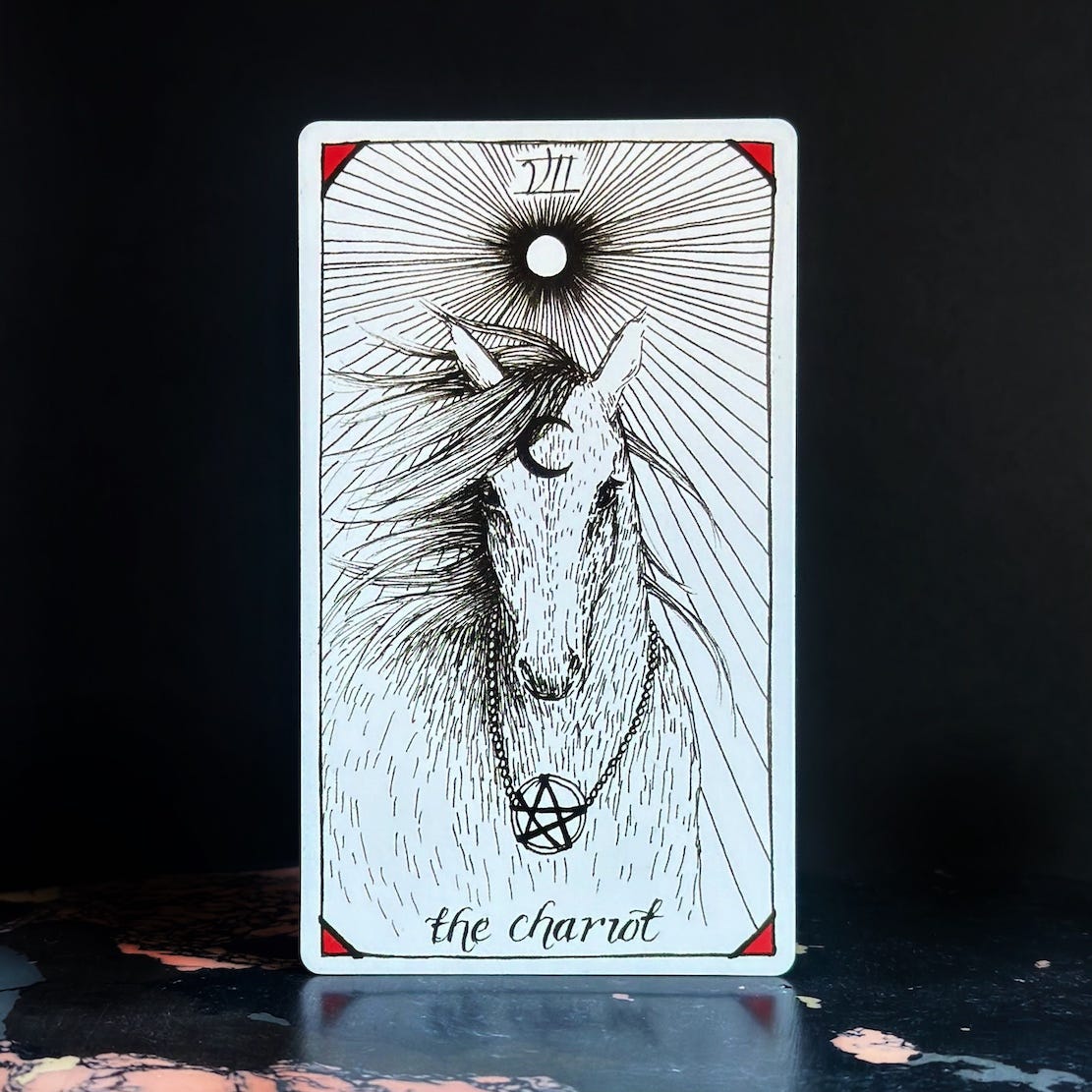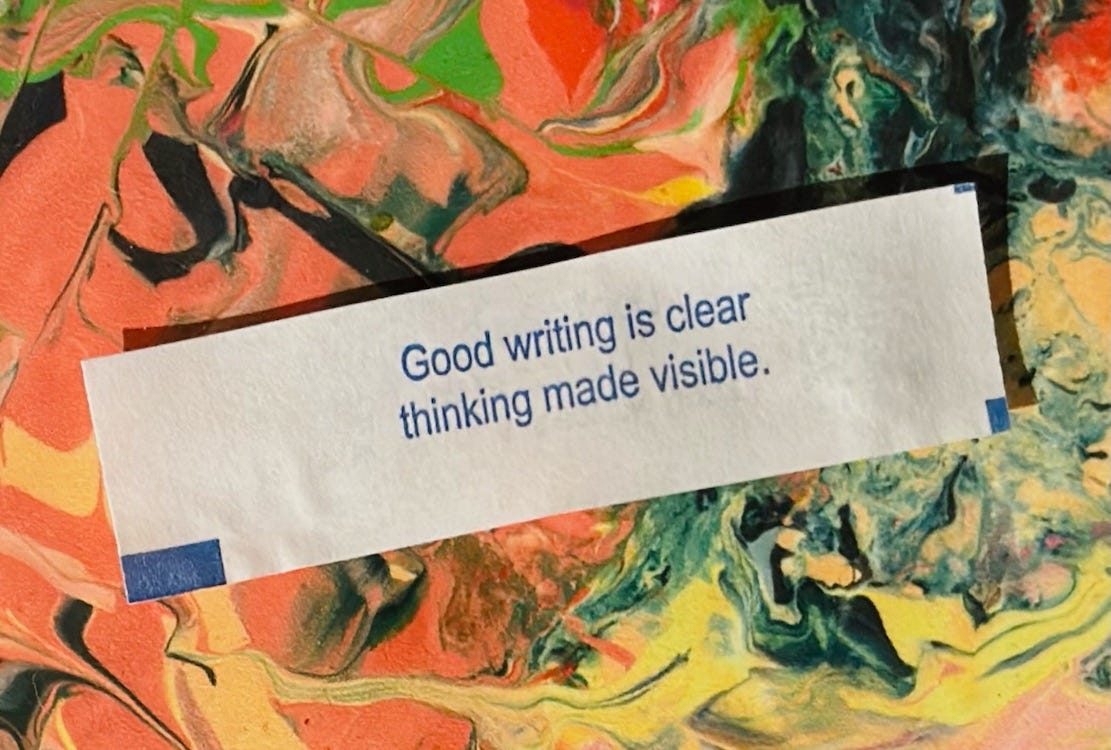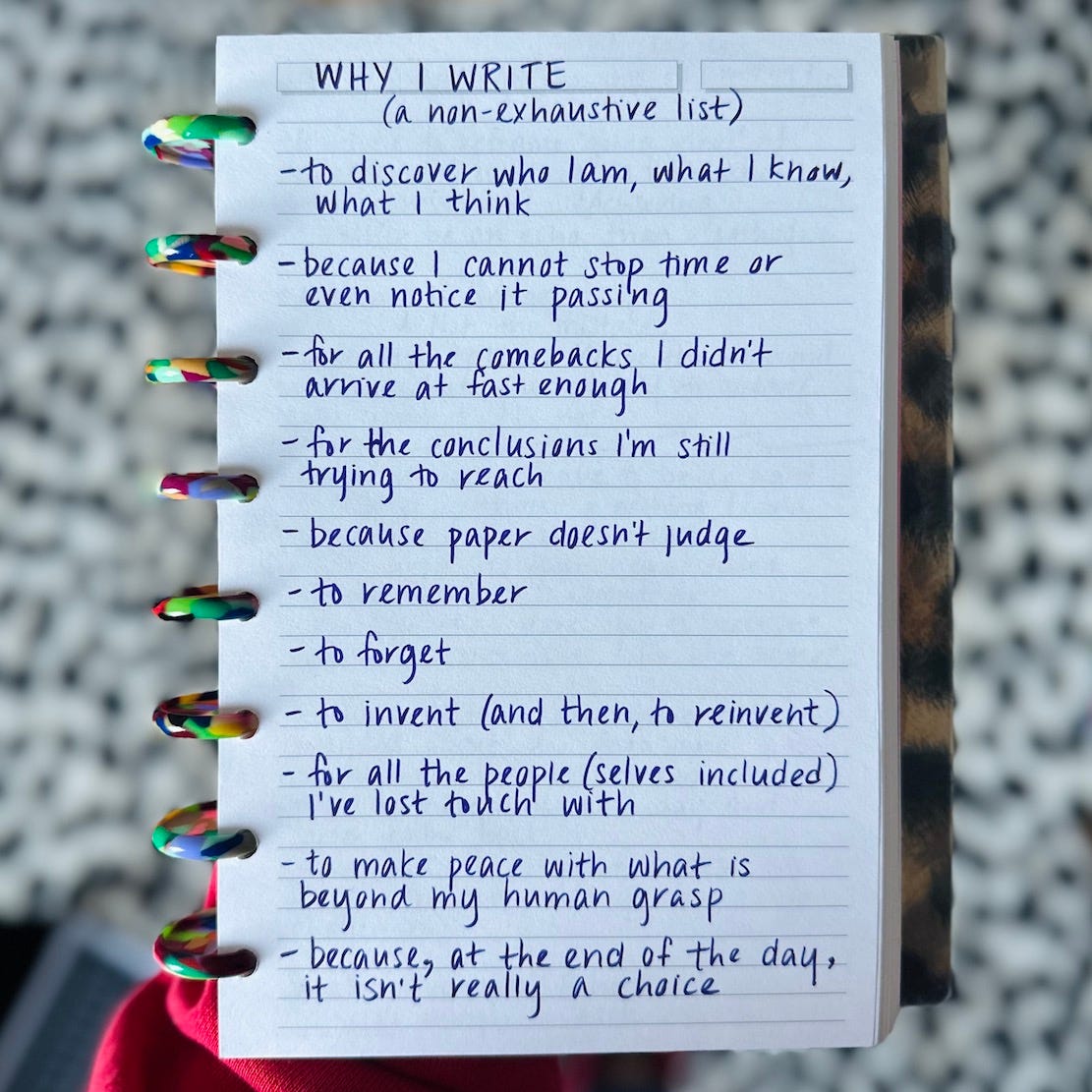For as long as I can remember, other people’s stories have kept me company.
Whenever I encountered a challenge, I searched for a book or essay written by someone who’d been there. Brave words helped me feel seen, counted, and understood. Writers, most of whom I will never meet, have led me, shaped me, and in many ways, saved me. Perhaps it’s no wonder I was called to do the same.
After a few false starts, I found my way to the publishing industry, first as an assistant at a literary agency, then a book editor, and eventually, a ghostwriter. I loved these jobs—shaping narratives, sharpening sentences, helping others tell their stories. But the more I worked with writers, the louder the truth became: I secretly wanted to be them.
Two competing voices whispered inside me:
“Why me?” said the first.
“Why not me?” challenged the second.
Personal writing—the realm of essays and memoir—seemed confined to the world of celebrities and titans of industry, or else celebrated literary figures. Memoir, I believed, was the dominion of outliers. And I was decidedly…not.
Then along came the internet and with it a culture of sharing. These days, the question is not whether we share, but how. How much is too much? Where is the line between brave and performative? Does trying to monetize make us a sellout, or merely smart?
Like that wasn’t enough to consider, along came the robots. The emergence of AI as both a powerful tool and maligned shortcut has only twisted the narrative. Is it a fool’s errand to labor for hours over a few measly paragraphs when a robot can summon them in seconds? (That was rhetorical. And no, it isn’t.) In a world that has us asking, “Did a robot make this?” with alarming frequency, I’d argue there is more value than ever in crafting something undeniably human.
To that end, here are 11 thoughts on creating and sharing meaningful personal work—online, in books, in private, or in whatever way calls to you.
1. Lean into the process.
Our society does not value process. We want a shortcut to the prize: productivity, output, profit. But when it comes to personal writing, I’d posit that the process is kind of the point.
While it may feel wonderful to share a polished piece of work or greet a new subscriber, few feelings compare to having written. To uncover what we think or know or feel, to land on a truth that until that moment was nothing more than a shadow in our subconscious. The value of creation lies in that messy, uncomfortable dance of introspection. This is where the alchemy, growth, and magic happen.
2. No one will say it quite like you.
It can be tempting to take stylistic cues from the voices that inspire us. After all, from the time we are eight months old, mimicry is how we learn. It also behooves us to use the tools at our disposal—teachers, editors, and even tech—to help improve our craft. But the truth is, your voice is the most powerful one you can employ, because no one else has it. Your experience and point-of-view are yours alone.
Sometimes, if I’m struggling with getting the wording right, I’ll speak instead of type. Reading out loud has a way of plunging the words quite literally into your voice: Does it sound like you? Does it feel natural? Does it ring true?
3. Connection is for everyone, including you.
When I sit down to write, I am often plagued by that old question: “Why me?” But then I remind myself of all the words that made a difference in my life—on love and grief and fear and triumph. You have a story to share, and you needn’t have experienced an alien abduction or won Olympic gold or scaled Kilimanjaro to be worthy of telling it. You are a human appealing to humans. That is more than enough.
4. Everyone loves an underdog.
Some of the most popular, well-received pieces I’ve shared over the years have all been crafted in the wake of struggle, failure, or misfortune. (Multiple writer friends have shared similar observations.) Readers enjoy a peek behind the curtain, to know they’re not alone. It’s a bit like the appeal behind hot mess reality TV—we all want to feel better about ourselves, and what better way than by commiserating?
Obviously, I’m not suggesting that anyone exploit the challenges in their life, nor fabricate or exaggerate misfortune. What I am saying is that if you’re holding onto that story of rejection, heartbreak, or loss because you fear it may invite judgment, please know: sharing it may be a gift.
5. Leave some fingerprints.
There is something about a handmade item. Whether we’re talking about a quilt, sweater, or piece of furniture, it’s not merely a matter of quality, but also the way it feels imbued with another’s essence—their spirit, effort, and care. Handmade words are no different. What we seek from art isn’t merely to be wowed, entertained or even moved, but to glimpse the mind and soul and truth behind it. To connect with the flawed human that brought it into being.
In our increasingly AI-saturated world, adding a personal touch feels more important than ever. So be imperfectly, unabashedly you. Unleash a personal turn of phrase. Don’t sweat the typos. Add a behind-the-scenes photo or a peek into your creative process. Share what you know and admit what you don’t. Aim for personal over perfection.
6. Personal writing does not equal crowdsourced therapy.
The English poet Radclyffe Hall wrote, “Writing, it was like a heavenly balm, it was like flowing out of deep waters, it was like the lifting of a load from the spirit; it brought with it a sense of relief.” The act of writing can sometimes feel like a tremendous exhale, the wordly exorcism of whatever ails us. But the writing we do when we’re going through it isn’t necessarily fit for public consumption. In my own practice, nothing gets shared until I am safely on the other side of it. Writing requires perspective. It also requires one to be secure in their convictions. If I’m in the process of working through something, or seeking validation or feedback, it’s not yet time.
7. Everything is a conversation.
A personal essay is a conversation between the person you are when you begin it and the person you become by the end. You don’t need to know all the answers at the outset; your future self will lead the way. Likewise, some of the best personal writing feels like a conversation with a friend. The reader is invited to witness this shift, coming on a guided tour of your discovery. By the end, they too are changed, though their destination may be quite different.
8. Dig deep and don’t hold back.
In the world of memoir, it is said that good writing is what you’re scared to share with others, while great writing is what you’re scared to share with yourself. So ask yourself: What are you scared to confront? What are you afraid to acknowledge, let alone broadcast to all of creation? That may be where your best work lies. To quote the incomparable Annie Dillard:
“One of the few things I know about writing is this: spend it all, shoot it, play it, lose it, all, right away, every time. Do not hoard what seems good for a later place in the book, or for another book; give it, give it all, give it now. The impulse to save something good for a better place later is the signal to spend it now. Something more will arise for later, something better. These things fill from behind, from beneath, like well water. Similarly, the impulse to keep to yourself what you have learned is not only shameful, it is destructive. Anything you do not give freely and abundantly becomes lost to you. You open your safe and find ashes.”
9. Others’ reactions are none of your business.
You owe it to your audience, and yourself, to make your point in a clear and compelling way. That is all.
What happens beyond that is anyone’s guess. People will misunderstand. They will project. They will get it wrong. That’s okay. At the end of the day, this isn’t a PR piece with a targeted agenda; it’s a work of art. Someone saw themselves reflected in your work. They felt something. Congratulations—you have done your job.
10. Sharing is a sacred duty.
The next time you find yourself asking, “Why bother?” remember Sean Thomas Dougherty’s poem with the same title.
Because right now, there is
someone
out there with
a wound
in the exact shape
of your words.
Whether you consider writing to be a hobby, a job, or your greatest love does not change its value. Nor will it dampen the synergy that happens when your words—your internality—meet another’s mind. This is nothing short of magic.
11. When all else fails…write your own rules.
These are the tenets that work for me, in my experience, at this point in time. Your findings may be different, and that’s okay.
Writing, particularly online, in the age of robots, is shifting terrain. Ours is a culture of clickbait and overwhelm. But writing is different—or at least, it can be. So, it behooves us to celebrate everything it can do and be and offer. Embrace all you have at your disposal: style and meter and punctuation. Use your words. Take it slow. Experiment. Have fun. Go deep. Get weird. Ramble. Keep it simple. There are no rules, nor constants—make it up as you go.
May the process be with you.
Some of the above was adapted from a guest essay I wrote for Jane Ratcliffe’s wonderful newsletter Beyond back in 2023. If you don’t already subscribe to Beyond, and appreciate wisdom and beauty and some of the best interviews you’ll ever read, I highly recommend it.
Last week’s mini individual tarot readings were so much fun, we’re doing it again this week! Pop into the paid subscriber chat this Friday, July 11th, between 10-11a.m. ET if you’d like me to pull a card for you. (I’ll start a new thread when it’s time.) If you can’t make it this week, don’t worry, it’ll happen again soon.

As always, today’s reading is meant in a reflective (rather than predictive) sense. Ponder it, journal about it, use it however you’d like. Take whatever may be helpful and leave the rest.
On the surface, the Chariot is a vehicle. A tool. A means to an end.
Yet the questions it poses go well beyond the surface. Are we in the driver’s seat? …Or are we a passenger? Do we know where we’re headed? Would we like to change course?
This card bears a message that every day is its own journey, a chance to chart your course and start again. Destinations are often an illusion. So much of life is less about moving forward than it is about moving onward.
Our bodies do not speak in weeks, months, or hours. Nor do they compute miles or meters or yards. Our bodies know lived experience. They recognize the shape of a day, the feelings unique to seasons. They understand light and darkness, coolness and warmth. They sense when something is sharp or soft or solid. This is our language, our currency, our means. Perhaps we are measuring too much, quantifying the wrong things. Perhaps we are following a course that doesn’t reflect our reality. Perhaps we are holding tightly to outdated or unnecessary ideals.
This week, the Chariot—that beacon of power, speed, and determination—gives us permission to re-chart the course or lighten the load. Let go of what does not serve you. How else can we expect to fly?
When we gaze out at the landscape stretching before us, what resonates in the core of our being? These are the only directions we need.
As always, thank you for reading. ❤️










We could restack fifty passages for fifty days and still not do scratch the surface of the wisdom and essentialism in here. 🙌🙏
I could read this over and over again every day for a month and still feel like I had not tapped all the lessons it contains. This is brilliant for all of us who doubt (that is to say, all of us).